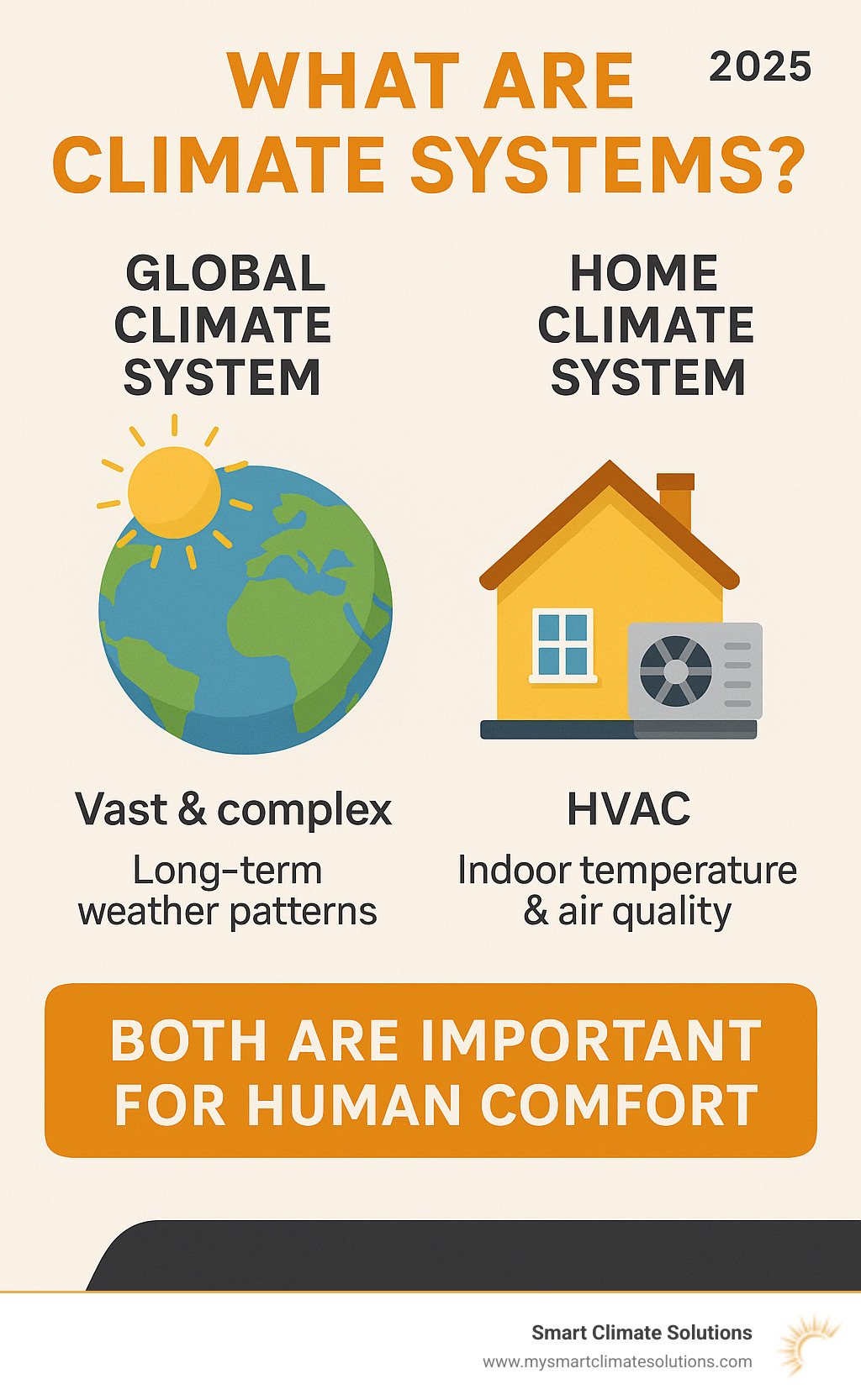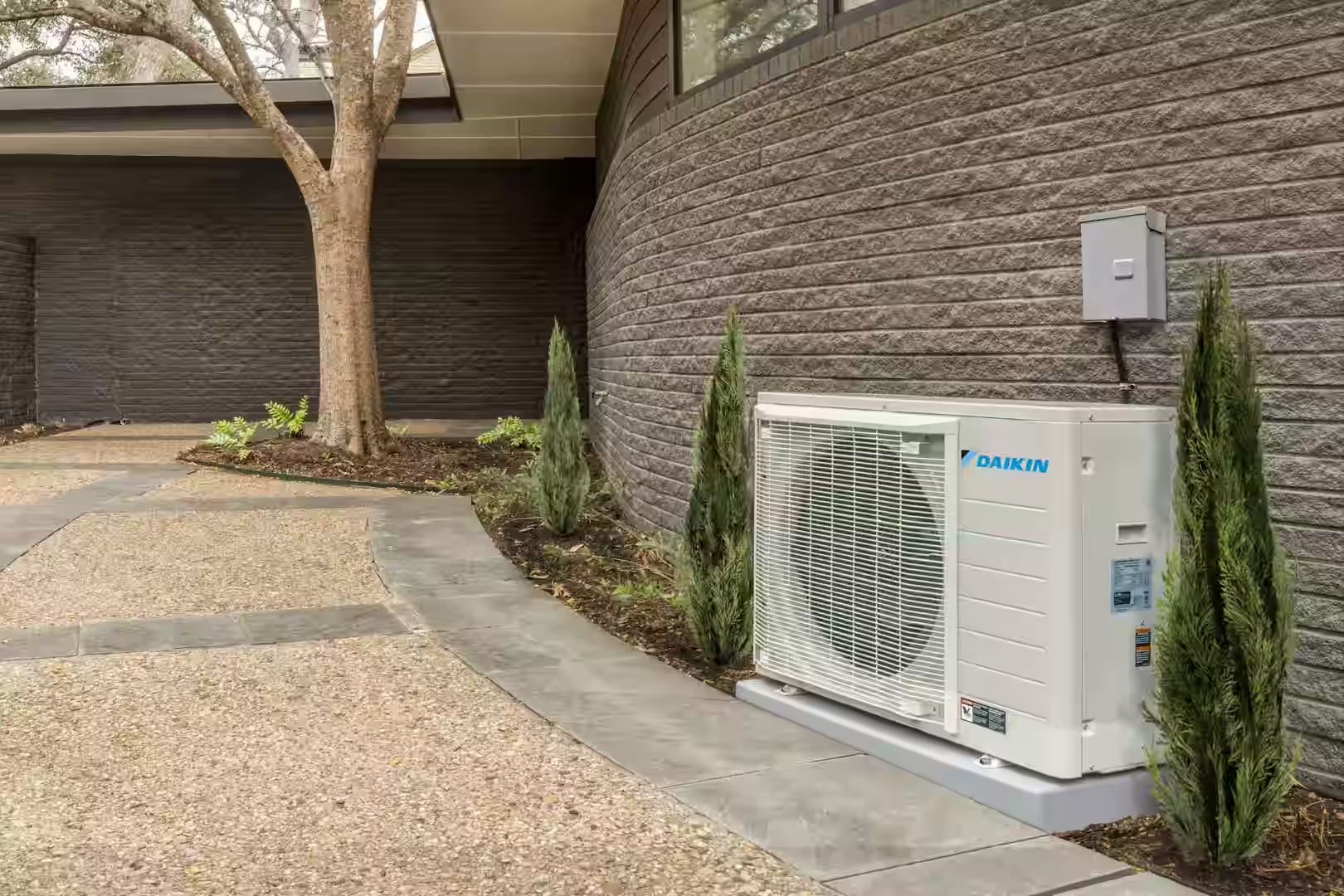Understanding Earth's Global Climate System
What are Climate Systems?
- Global Climate Systems: These are Earth's natural components-atmosphere, oceans, land, ice, and living things-that interact to create long-term weather patterns. They are vast and complex.
- Home Climate Systems: This refers to your home's HVAC (Heating, Ventilation, and Air Conditioning) equipment, designed to control indoor temperature, humidity, and air quality.
- Need an HVAC solution? Smart Climate Solutions provides expert installation, maintenance, and repair to keep your home comfortable year-round.
The world is shaped by climate systems. Weather is a short-term snapshot, like a rainy or sunny day. Climate, however, describes average weather over many years. Understanding global climate systems highlights the importance of home comfort. When extreme heat or cold strikes, your home's "climate system"-your HVAC-creates a perfect indoor environment.
I'm Bill Scott, General Manager of Smart Climate Solutions. With over 15 years in the HVAC industry, I know how crucial it is to manage your home's internal climate systems. In this guide, we'll explore how Earth's climate works and how your HVAC system helps you master indoor comfort.

Our planet's climate systems are intricate, driven primarily by the sun's energy. Earth constantly absorbs, reflects, and redistributes this energy. The sun provides an average of 342 Watts per square meter to our atmosphere, acting as the engine for our global climate systems.
Earth manages this energy through a delicate balance. About 30% of solar energy is reflected back into space by light surfaces like clouds and ice (Earth's albedo). The other 70% is absorbed by darker oceans and land, heating our planet. This balance directly influences global temperatures. Without it, Earth's average temperature would be a chilly -19 C (-1 F)!
A crucial part of this balance is the greenhouse effect. Atmospheric gases like water vapor, carbon dioxide, and methane trap some of this absorbed heat, preventing it from escaping into space. This natural process keeps the lower atmosphere at a habitable 14 C (57 F). While water vapor is the dominant contributor, CO2 also plays an important role. This natural greenhouse effect is essential for life.
Beyond solar energy, other natural factors influence Earth's climate systems, including subtle shifts in Earth's orbit (Milankovitch cycles), the moon's gravitational pull, and heat from Earth's core. However, the sun remains the primary driver. For a deeper dive, we recommend checking out NASA's page on The study of Earth as an integrated system.
The global climate system is a complex web of five main components, or "spheres":
- Atmosphere
- Hydrosphere
- Cryosphere
- Lithosphere
- Biosphere
These five spheres constantly interact, creating the dynamic climate we experience.
The Five Components and Their Interactions
Let's break down these five components:
Atmosphere: This is the protective air bubble surrounding our planet. It's mostly nitrogen (78.1%) and oxygen (20.9%), with trace gases like carbon dioxide. The atmosphere is where weather happens. Its constant movement distributes heat and moisture, making it the most dynamic component.
Hydrosphere: This includes all water on our planet-oceans, rivers, groundwater, and clouds. Oceans cover 71% of Earth's surface and are massive heat reservoirs. They transport heat through powerful currents, influencing regional climates and playing a key role in the carbon cycle.
Cryosphere: This is all the ice on Earth, including ice caps, glaciers, and permafrost. It holds nearly 70% of Earth's freshwater. The cryosphere is crucial for its high reflectivity (albedo), bouncing solar energy back into space. Melting ice reduces this effect, creating a warming feedback loop.
Lithosphere: This component includes the Earth's solid outer layer-its crust. Geographical features like mountains and valleys influence climate systems over long timescales. Volcanic eruptions, for instance, can release gases that temporarily cool the planet.
Biosphere: This is where life thrives, including all living organisms. The biosphere interacts profoundly with all other spheres. Plants absorb carbon dioxide, and ecosystems alter land surfaces, affecting albedo. The biosphere's health is linked to and impacted by changes in the other climate systems.
These spheres are deeply interconnected. A change in one sphere ripples through the others. For example, melting ice (cryosphere) changes ocean levels (hydrosphere) and reduces Earth's reflectivity, leading to more warming (atmosphere).
Natural vs. Human-Induced Climate Change
Earth's climate systems have always fluctuated naturally. Over geological time, factors like orbital changes (Milankovitch cycles) have driven ice ages and warmer periods. Major volcanic eruptions can also cause short-term cooling. These are natural climate drivers.
However, the current global warming trend is different. Today's climate is warming rapidly, and the primary cause is human activity. Since the Industrial Revolution, burning fossil fuels and deforestation have drastically increased greenhouse gases in the atmosphere.
These gases act like a thickening blanket, trapping more heat. While water vapor is the strongest natural greenhouse gas, human activities have significantly increased others like carbon dioxide (CO2). CO2 concentration has increased by more than 30% since pre-industrial times. This improved greenhouse effect causes the planet to retain more heat and its average temperature to rise.
This human-induced change is observable. Global mean atmospheric warming since the late 19th century is estimated at 0.4 to 0.8 C, and sea levels have risen. These trends are a direct consequence of human activities. For detailed evidence, the Intergovernmental Panel on Climate Change (IPCC) confirms that Today's rising temperatures are caused by greenhouse gases.
How Global Climate Affects Your Local Weather and Comfort
Have you ever considered how large-scale climate systems affect your everyday comfort? It's not just for scientists. The vast processes we've discussed, like the movement of heat by oceans and the atmosphere, directly shape the weather you experience.
Imagine the sun's energy hitting Earth, strongest at the equator and weakest at the poles. This creates a large temperature difference. Our planet's atmosphere and oceans work to even this out, moving heat from warmer to colder spots. This movement creates global circulation patterns, which are like Earth's natural heating and air conditioning system, driving the ocean currents and wind patterns that shape our local weather.
When these powerful global climate systems shift, it can lead to more intense local weather events. We're talking about scorching heatwaves, sudden cold snaps, or weeks of uncomfortable humidity levels. While weather is always short-term, these extreme events are becoming more common and stronger due to long-term climate changes.
This highlights the need for reliable home comfort. When climate-driven extremes occur, your home should be a safe haven. That's where your personal climate systems-your HVAC equipment-become vital.
Want to learn more about how these large-scale air movements work? Check out the details on Global circulation patterns.
From Global Trends to Your Front Door
The big picture of global climate systems drills down to specific regional climate variations. Factors like topography (the shape of the land) can block winds or trap moisture, influencing rain and temperature. Also, being close to large bodies of water like oceans can moderate temperatures, leading to milder winters and cooler summers.
These local differences directly affect your daily life and how you handle seasonal changes. A summer heatwave in Pittsburgh, PA, feels different from one in Steubenville, OH, but both require effective cooling. A cold snap in Washington, PA, or Burgettstown, PA, means you'll need reliable heating. Understanding your area's typical seasons is key to preparing your home for weather extremes.
At Smart Climate Solutions, we emphasize being proactive. By knowing the seasonal shifts in areas like South Hills, PA, St. Clairsville, OH, or Weirton, WV, we can help ensure your HVAC system is ready. A well-prepared system provides comfort and can lead to significant energy savings. For more tips, see our guide on Energy Saving HVAC Tips.
Why Your Home Needs Its Own Climate System
Given how dynamic Earth's climate systems are, your home's internal climate system is your personal shield. Its main job is to create a steady, comfortable indoor environment, no matter the weather outside.
Why is a dedicated climate system so crucial?
First, it's about maintaining a stable indoor temperature. Your HVAC system works to keep your home at your ideal temperature, protecting you and your belongings from extremes.
Second, it's about controlling humidity. Humidity greatly affects comfort. Too much makes the air feel sticky, while too little can cause dry skin. Your HVAC system helps balance the moisture in your air.
Next is air quality and filtration. Modern HVAC systems filter out dust, pollen, and other particles, improving the air you breathe and creating a healthier living space.
Your home's climate system is all about creating a comfortable living space. A pleasant indoor environment helps you relax, work, and sleep better, boosting your well-being.
Finally, it's vital for protecting your home from mold and mildew. Proper humidity control from your HVAC system is a key step in preventing mold growth, which can damage your home and pose health risks.
For more on how these systems benefit your home, check our article on Residential HVAC System Solutions Cape Coral FL. The information is valuable for any homeowner.
Mastering Your Home's Climate Systems with HVAC Technology
Just as Earth has vast climate systems, your home has its own, with your HVAC equipment at its heart. HVAC stands for Heating, Ventilation, and Air Conditioning. These components work together to control your home's temperature, humidity, and air quality, ensuring optimal indoor comfort.
At Smart Climate Solutions, we know mastering your home's climate systems means having reliable, efficient equipment. Whether it's a cold winter day in Pittsburgh PA or a hot summer afternoon in Weirton WV, your HVAC system is essential.
Your heating system, like a furnace, creates warmth. Your cooling system, an air conditioner, removes heat and humidity. And ventilation brings in fresh air. These pieces work in harmony to create your perfect indoor climate. If you're curious about heating options, you might like our guide on the Most Efficient Residential Heating System.
Types of Residential HVAC Climate Systems
Home climate systems offer many smart options, each with benefits for different homes and needs.
Central Air Conditioners and Furnaces are the most common, using ducts to distribute conditioned air. A central AC cools the air, while a furnace heats it, typically with natural gas, oil, or electricity.
Heat Pumps are clever systems that both heat and cool. In summer, they move heat out of your house. In winter, they pull heat from the outside air and bring it inside. They are very energy-efficient, especially in milder climates.
For homes without ducts, Ductless Mini-Splits are a fantastic option. They allow you to control the temperature in different zones, providing precise comfort and saving energy. Learn more about the benefits of Whole Home Ductless HVAC.
Packaged Systems are all-in-one units with heating and cooling parts in a single cabinet. Usually installed outside, they are great for homes where indoor space is limited.
Finally, highly efficient Geothermal Systems use the Earth's stable underground temperature to heat and cool. They use buried loops to exchange heat, offering incredible energy savings and being very environmentally friendly.
Choosing the right climate system depends on your home's size, local weather, and comfort preferences. Our experts at Smart Climate Solutions can help you steer these choices.
The Importance of Regular Maintenance and Tune-Ups
Getting a great HVAC system is the first step. Regular maintenance and tune-ups are vital to keep it running smoothly, much like a regular check-up for your car.
Here's why routine maintenance is crucial:
- System efficiency: A well-maintained system uses less energy to heat and cool, which is better for your wallet and the environment.
- Lowering energy bills: Greater efficiency leads to lower monthly utility costs and significant long-term savings.
- Preventing breakdowns: Regular checks catch minor issues before they become major, costly repairs, preventing unexpected outages.
- Extending equipment lifespan: Proper servicing helps your HVAC system last longer, protecting your investment and delaying replacement costs.
- Ensuring clean air: Maintenance includes filter changes, which are vital for trapping pollutants and improving your indoor air quality.
We offer full-service support to keep your climate systems in top shape. From detailed AC Maintenance to thorough Furnace Tune Up services, we have your needs covered.
Frequently Asked Questions about Climate Systems
We love talking about climate systems, both the vast ones shaping our planet and the cozy ones in your home. It's natural to have questions. Here are some common ones, explained simply:
What is the fundamental difference between weather and climate?
This is a great question that clarifies the big picture. Think of it this way:
Weather is what's happening in the atmosphere right now or in the near future. It's short-term, changes constantly, and describes specific conditions like rain or sun in a small area.
Climate, on the other hand, is the long-term pattern of weather in a region, averaged over 30 years or more. It describes what is typical for a season, like cold, snowy winters. Climate defines the long-term expectations, while weather is the daily reality. Understanding global climate systems helps predict these patterns.
How do greenhouse gases warm the Earth?
It's a natural process vital for life. Think of greenhouse gases as a cozy blanket for our planet.
Gases like carbon dioxide and water vapor in our atmosphere allow sunlight to pass through and warm the Earth. When the Earth radiates some of that heat back toward space, these gases trap a portion of it, keeping our lower atmosphere warm. This natural greenhouse effect is essential, as without it, Earth would be a frozen, uninhabitable planet.
However, human activities like burning fossil fuels have increased these gases, making the "blanket" thicker. This traps more heat and causes Earth's average temperature to rise faster than it would from natural cycles.
Are HVAC maintenance plans worth the cost?
Yes, absolutely! Think of your HVAC system as the heart of your home's personal climate systems. Just like your own health, it needs routine care to stay in top shape.
Investing in a maintenance plan is a smart move for several reasons:
- System efficiency: A well-tuned system runs more smoothly and uses less energy, keeping your home comfortable without high utility bills.
- Lowering energy bills: Efficiency gains lead to noticeable savings on your monthly energy costs.
- Preventing breakdowns: Our technicians can spot small issues before they become major, costly repairs, saving you from inconvenient outages.
- Extending equipment lifespan: Proper care helps your unit last longer, delaying the need for an expensive replacement and protecting your investment.
- Ensuring clean air: Maintenance includes cleaning and replacing filters, which is key to maintaining healthy indoor air quality.
So, are they worth it? Definitely. A maintenance plan is an investment in your comfort, finances, and your home's long-term health. For a deeper dive, check our article: Are HVAC Maintenance Plans Worth It.
Your Partner for Perfect Indoor Climate Control
While we can't control Earth's massive global climate systems, we can absolutely master the climate systems in your home. That's where Smart Climate Solutions comes in. We are your local partners in creating the perfect indoor environment, no matter what Mother Nature brings.
You've learned how complex global climate can be. You don't want to be at the mercy of both the weather and a failing HVAC system. That's why a reliable, professional HVAC partner isn't just convenient-it's essential.
Our team brings over 15 years of experience to every job. We are certified professionals who understand how your home's climate systems work and how to keep them running smoothly. When you call us, you're getting expertise refined over decades of helping families stay comfortable.
We know HVAC emergencies don't wait for business hours. A furnace can quit on the coldest night of the year in Pittsburgh PA. That's why we offer 24/7 emergency support. Whether it's a hot summer day in Steubenville OH or a freezing morning in Washington PA, we're here when you need us most.
Energy efficiency is a commitment for us. We focus on ensuring your system operates at peak performance, which means lower utility bills and a smaller environmental footprint. In areas like South Hills PA, Burgettstown PA, St. Clairsville OH, and Weirton WV, an efficient system is a necessity.
Your comfort is our priority. We're not just fixing equipment; we're ensuring your home remains your sanctuary. Whether you need installation, maintenance, or emergency repair, our local experts understand our region's unique climate challenges.
Ready to experience the difference professional service makes? Learn more about our offerings at Expert HVAC Service And Repair. Let Smart Climate Solutions be your trusted partner in mastering your home's climate systems-because while we can't control the weather, we can control your comfort.










.png)
